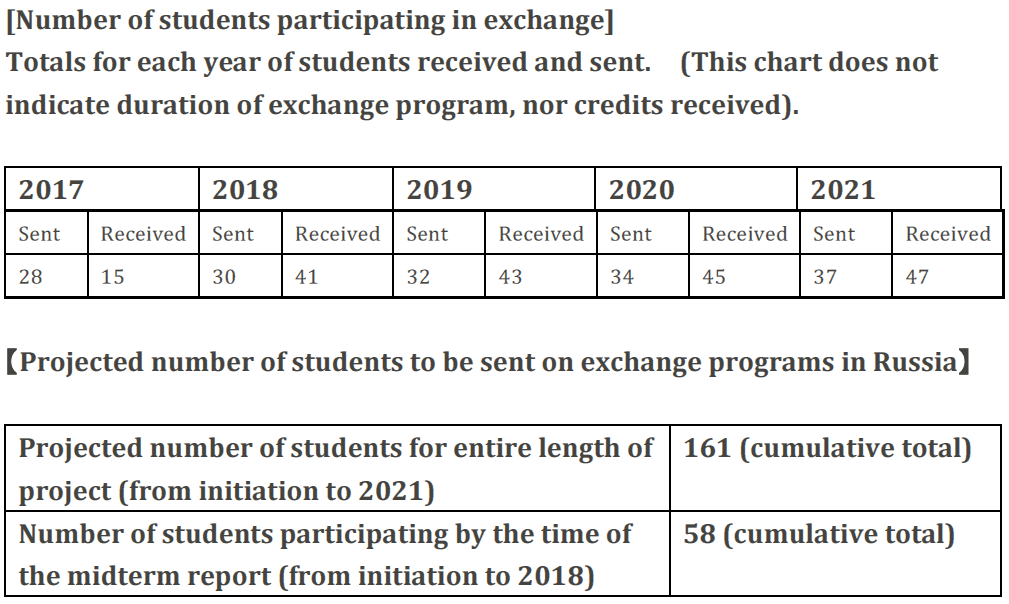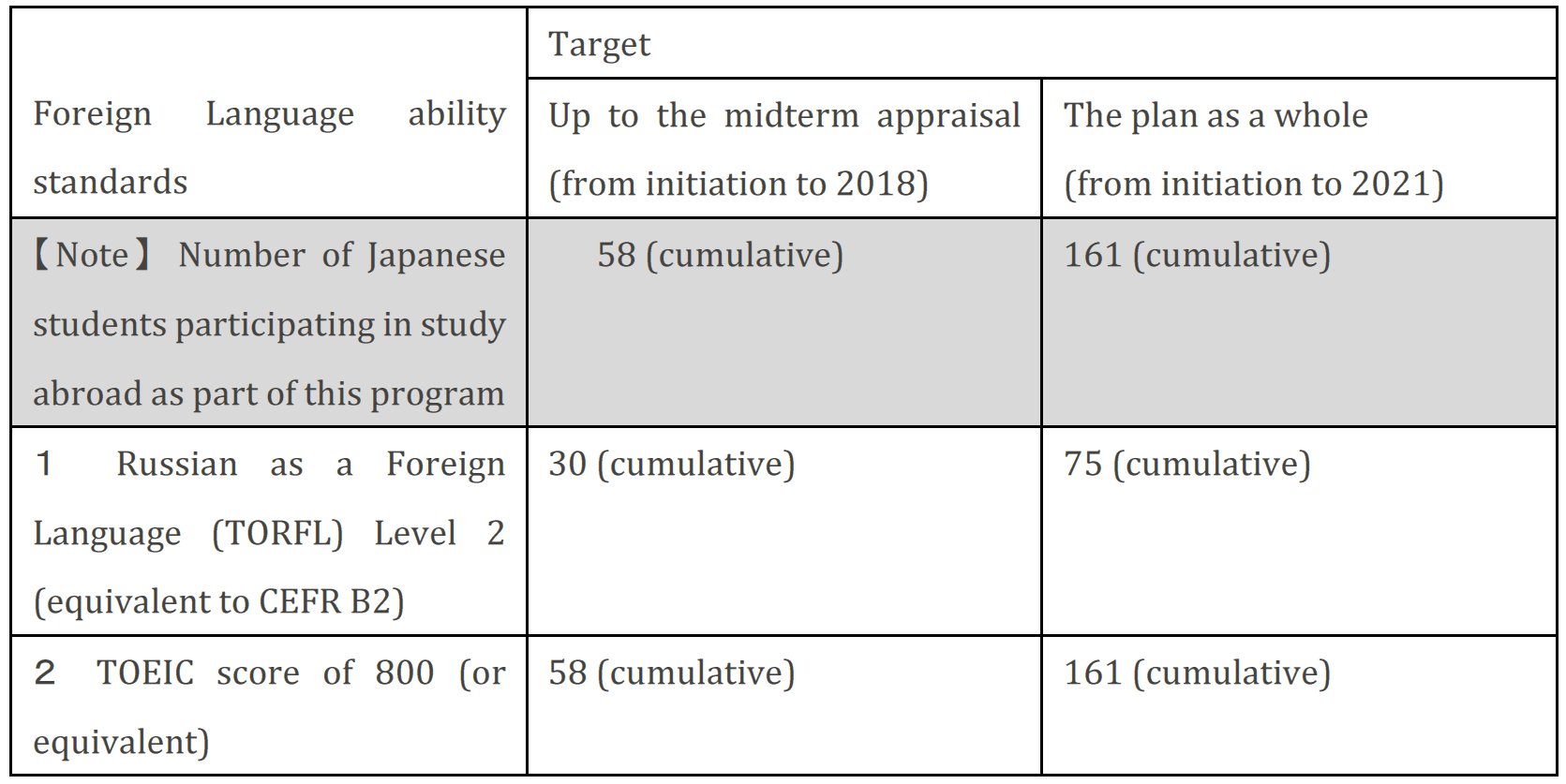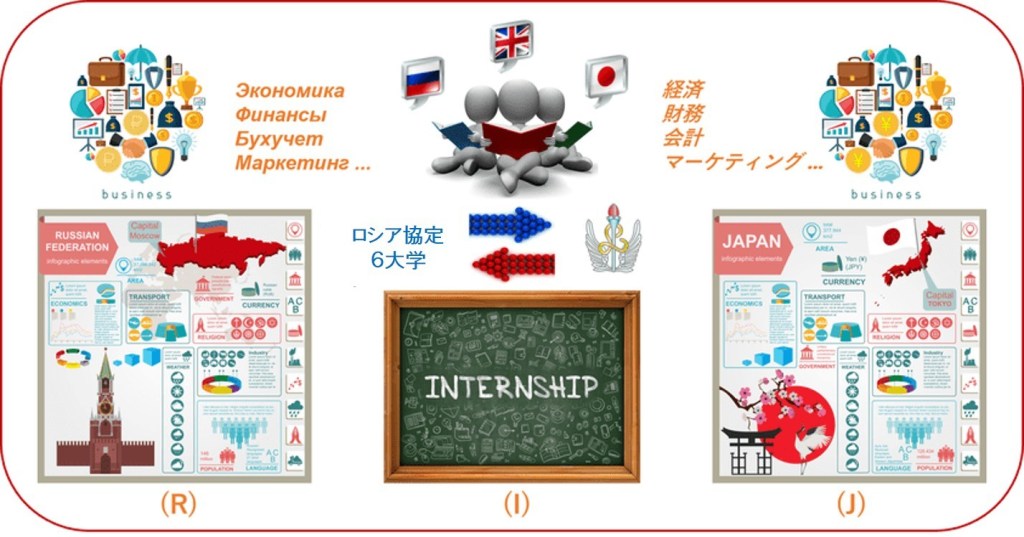Overall project plan and goals (from initiation until 2021)

Breakdown of figures

The process up to the accomplishment of the goal (with reference to both the project plan as a whole, and to the midterm evaluation)
<Short-term Exchange Programs>
- Short-term exchanges generally involve 1st or 2nd-year students going on abroad during the winter quarter or the summer quarter, while enrolled in the ‘Short-term Study Abroad’ course (tanki kaigai ryugaku kamoku).
- In addition to the ‘Two Cities-Two Universities’ program held in Summer quarter by Lomonosov Moscow State University and St. Petersburg State University, the Russian language program held by Far Eastern Federal University, and the summer course on Russian foreign policy and politics held by Moscow State Institute of International Relations, students are also being dispatched to participate in the summer course held by the Higher School of Economics and Russian State University for the Humanities. Currently, emphasis is being placed not just on language courses, but on dispatching TUFS students to study in courses which feature classes on Russian foreign policy, politics, and economics taught in English and Russian.
- Starting with the dispatch of 12 students in 2016, it is intended that 13 students be sent abroad in 2017. Following this, the number of students will gradually increase, reaching 22 students by 2021.
<Long-term Exchange Programs>
- For long-term exchanges, the number of TUFS students sent to participate is dependent on the terms of the agreement with the host university. Lomonosov Moscow State University accepts three students, Moscow State Institute of International Relations accepts two students, Russian State University for the Humanities accepts three students, the Higher School of Economics accepts two students, St. Petersburg State University accepts three students, and Far Eastern Federal University accepts two students, for a total of 15 students accepted annually.
- Selection of exchange students is made on the basis of an interview, a short Russian-language essay, as well as consideration of the applicant’s GPA and their motivation in applying for study abroad in Russia.
- Students who do study in Russia are expected to earn approximately 8 credits, which will be recognized by TUFS.
 Target process (Both regarding the plan as a whole and the midterm evaluation)
Target process (Both regarding the plan as a whole and the midterm evaluation)
<Short-term programs>
- Russian students encouraged to attend TUFS through participation in 1. Russian-Japanese tandem learning, and 2. ‘International Japanese Studies’ courses taught in Russian during the TUFS summer quarter. Both of these activities are now recognized by TUFS as formal, potentially credit-earning courses.
- Russian participants in the TUFS summer program receive certificates of completion from TUFS, potentially allowing them to receive credit recognition from their home universities.
- TUFS students perform the role of tutors to the Russian students, allowing greater interaction between Russian exchange students and TUFS students.
- In 2018, the inaugural year, TUFS will accept 26 Russian students. This number will gradually be increased, with 32 Russian students anticipated to be participating in 2021.
<Long-term programs>
- The number of exchange students accepted by TUFS is dependent upon the agreements with their home universities. TUFS currently accepts three students from Lomonosov Moscow State University, two students from Moscow State Institute of International Relations, three students from Russian State University for the Humanities, two students from the Higher School of Economics, three students from Saint Petersburg State University, and two students from Far Eastern Federal University, for a total of 15 students annually.
- With the goal of fostering their Japanese-language abilities and basic knowledge of Japan, long-term exchange students are enrolled in a strenuous Japanese language program (Comprehensive courses and skill-specific courses) tailored to their individual abilities, and take approximately 5 courses from among the University’s Japanese Comprehension General Education courses.
- Reciprocally-enrolled exchange students are encouraged to take approximately 10 credits-worth of language course, and 10 credits-worth of Japanese Comprehension General Education courses, which can then be recognized by their home universities.
【The kind of global talent we seek to promote】
TUFS has established five key strengths which typify students who possess global talent, which are codified in the curriculum policy, and in the diploma policy.
- Superior language abilities (as evidenced through language course grades)
- Knowledge of Japan and of the world (as evidenced in area studies course grades)
- Ability to contribute to modern society (as evidenced in grades from 1st-year coursework and Global Education courses)
- Professional knowledge (as evidenced in course grades from their discipline)
- The ability to think, act, and communicate independently (as evidenced from participation in exchange programs, volunteer activities, and so forth)
With this policy in mind, this program aims to foster individuals with following abilities related to Japanese-Russian business.
<Language Abilities>
Trilingual abilities, including the ability to use Russian and English at an advanced level (item 1)
<General knowledge about Russia and expertise regarding Russian economics>
Key basic knowledge, especially knowledge of accounting, statistics, economic, as well as general knowledge of Japanese-Russian society, economics, and culture (items 2 and 4).
<Adjustment and action abilities>
Japanese-Russian business talent, such that graduates are capable of meeting the demands of diverse stakeholders, solving problems, have the necessary tenacity, respect for others, ability to cooperate, and the ability to act autonomously and imaginatively. At TUFS, students are expected to refine such talent, through both the education they receive and the overseas study they participate in (items 3 and 5). Students from the six Russian universities that TUFS currently has partnerships with are similarly provided with opportunities to improve their understanding of Japan, its economy, and their understanding of the Japanese language. Russian students, like their TUFS classmates, are provided the opportunity to participate in internships which will help them foster their adjustment and action abilities.
Targets up to the midterm evaluation (From program initiation to 2018)
Regarding the aforementioned goals, the following goals have been accomplished as of 2018.
<Language ability>
It is the intention of the program to foster the trilingual abilities of program participants. Particularly, it is hoped
<Basic knowledge of Russia and expertise regarding its economy>
Participants in this program are confirmed to be taking both courses offered by the Russian department as well as courses related to Russia and to economics.
<Adjustment and action abilities>
Adjustment and action abilities have been fostered through short-term exchange programs in Russia (attended by 28 students), long-term exchange programs (attended by 30 students), as well as internships (attended by 58 students).
Target number of students to attain foreign language aptitude standards as established in the program plan

■Russian
TUFS students are expected, in order to enter the third year of the major, to pass level one of the Russian Federal Ministry of Education’s Test of Russian as a Foreign Language (TORFL) (equivalent to CEFR B1).
This program has set a higher goal, namely Level 2 on the TORFL (equivalent to CEFR B2), which it has been determined is a reasonable goal for exchange students who participate in long-term exchange programs.
■ English
Recognizing the indispensability of English in this globalized society, TUFS has established a TOEIC score of 800 (or equivalent) for all students. This program has set itself to the task of working towards that goal.
The process of goal attainment up to the midterm evaluation (from program initiation to 2018)
■ Russian
Utilizing the criteria set forth in CEFR-J, which was developed at TUFS, the level of attainment of Russian language ability by students at the end of their 1st and 2nd years has been made visually clear.
■ English
Progress is being made towards implementing measures aimed at assessing and strengthening the English-language abilities of students majoring in Russian. Efforts are being made to encourage practical, supplemental learning through intensive English courses.
Concrete abilities to be attained by students besides linguistic abilities
Goals of the Program’s Whole Plan (From program initiation to 2018)
Besides fostering linguistic abilities, this program also seeks to foster the following two abilities.
<Basic knowledge of Russia, and expertise regarding its economy>
Efforts are being made to foster students’ possession of essential basic knowledge regarding economics, statistics, and accounting, as well as general knowledge regarding Japanese and Russian society, culture, and economy.
<Adjustment and action abilities>
Efforts are being made to foster students’ possession of the tenacity, respect for others, cooperativeness, autonomy, and creativity which are requisite for accomplishing tasks and balancing the demands of various stakeholders.
Goals up to the midterm evaluation (from program inception to 2018)
Regarding the aforementioned goals, the following goals have been accomplished as of 2018.
<Basic knowledge of Russia and expertise about its economy>
It has been confirmed that students participating in this program are attending Russian Area courses, as well as courses related to Russia or to economics.
<Adjustment and action abilities>
Through participation in short-term exchange programs (attended by 28 students), long-term exchange programs (attended by 30 students), or participation in internships (attended by 58 students), students’ adjustment and action abilities have been fostered. The intention is to have this result confirmed by a firm such as BENESSE GP Academics.
★ To accomplish these goals, the RJI Program was created to serve in the guiding students. At the first Expert and Outside Evaluators Committee Conference, the proposal was brought forth by committee members. It was announced to all students for the first time in the fall of 2018. It made clear to participants in this program what courses they should be taking, and the number of credits they needed to obtain in order to attain talents in the field of Japanese-Russian business.

